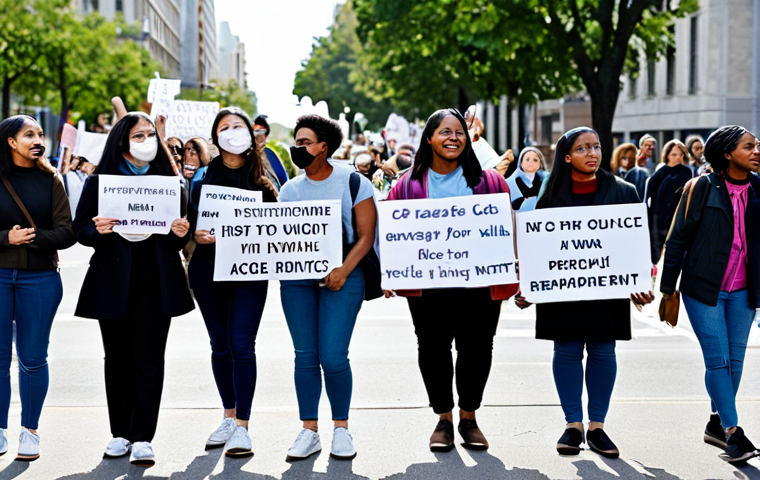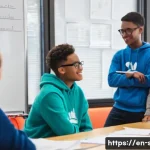Navigating the often-murky waters of sex education and women’s rights is crucial in today’s world. It’s not just about the birds and the bees anymore; it’s about empowerment, consent, understanding our bodies, and fostering a society where everyone is treated with respect and dignity.
Speaking from experience, having open and honest conversations about these topics early on can make a world of difference in shaping healthy relationships and informed choices.
From the latest research on consent education to the ongoing fight for reproductive rights, there’s a lot to unpack. The future hinges on our ability to equip young people with the knowledge and tools they need to navigate their sexual health and relationships responsibly.
Let’s delve deeper and get a precise understanding in the following article!
## Unveiling the Layers of Consent: Beyond “Yes” and “No”Consent. It sounds straightforward, right? A simple “yes” or “no.” But trust me, after years of navigating relationships and observing the dynamics around me, I’ve learned it’s anything but.
It’s a continuous, enthusiastic, and informed agreement. Think of it less as a one-time declaration and more as an ongoing conversation.
1. The Enthusiastic “Yes”: Why It Matters

It’s not enough for someone to simply not say “no.” True consent is about an enthusiastic “yes,” a genuine desire to participate. I remember a time when a friend told me about a situation where she felt pressured to go along with something she wasn’t really comfortable with.
She hadn’t explicitly said “no,” but her body language and hesitation spoke volumes. That’s when I realized the importance of looking beyond just the words and paying attention to the whole person.
An enthusiastic “yes” creates a safe and empowering environment for everyone involved.
2. The Grey Areas: Understanding Coercion and Pressure
Life isn’t always black and white, and neither is consent. There are grey areas where coercion or pressure can cloud the picture. Maybe someone feels obligated to say “yes” because of their partner’s expectations, or perhaps they fear the consequences of saying “no.” These situations are incredibly complex and require careful consideration.
Creating open lines of communication, where individuals feel safe expressing their boundaries without fear of judgment or retribution, is paramount.
3. Communicating Your Boundaries: A Skill Worth Honing
Learning to articulate your boundaries is a skill, not an innate ability. It takes practice and self-awareness. I’ve had my fair share of awkward conversations where I struggled to express what I wanted or didn’t want.
But with each experience, I became more confident and assertive in my communication. Remember, you have the right to change your mind at any time, and your partner should respect that.
Comprehensive Sex Education: Filling the Gaps
Growing up, my sex education was… lackluster, to put it mildly. It was a brief, awkward discussion about anatomy and reproduction, with very little emphasis on pleasure, relationships, or consent.
And I know I’m not alone in that experience. Comprehensive sex education aims to fill those gaps, providing young people with the knowledge and skills they need to make informed decisions about their sexual health and relationships.
1. Beyond Biology: Addressing Relationships and Emotions
Sex education shouldn’t just be about biology; it should also address the emotional and relational aspects of sex. Learning about healthy communication, conflict resolution, and empathy can help young people navigate the complexities of relationships with greater confidence and understanding.
2. Challenging Harmful Stereotypes and Promoting Body Positivity
Sex education has the power to challenge harmful stereotypes about gender, sexuality, and relationships. By promoting body positivity and celebrating diversity, we can create a more inclusive and accepting society where everyone feels valued and respected.
3. Access to Resources: Empowering Informed Choices
Providing young people with access to accurate and reliable information about contraception, STI prevention, and sexual health services is essential for empowering them to make informed choices.
I remember the confusion and anxiety I felt when I first started exploring my sexuality, and I wish I had had access to more comprehensive resources.
Reproductive Rights: A Cornerstone of Women’s Empowerment
The fight for reproductive rights is far from over. Access to abortion, contraception, and comprehensive reproductive healthcare is essential for women’s autonomy and equality.
It’s about allowing women to make decisions about their own bodies and futures.
1. The Impact of Restrictive Laws: Real-Life Consequences
Restrictive abortion laws have real-life consequences, particularly for women in marginalized communities who may not have the resources to travel to other states for care.
I’ve seen firsthand the stress and hardship these laws can cause, and it’s heartbreaking.
2. The Importance of Accessible Healthcare: A Matter of Equity
Access to affordable and accessible reproductive healthcare is a matter of equity. Every woman, regardless of her socioeconomic status or geographic location, deserves the right to control her own reproductive destiny.
3. Advocacy and Activism: Making Our Voices Heard
We can all play a role in advocating for reproductive rights. Whether it’s contacting our elected officials, supporting organizations that provide reproductive healthcare services, or simply speaking out about the importance of these issues, every action counts.
Digital Sex Education: Navigating the Online World
In today’s digital age, young people are bombarded with information about sex and relationships online. It’s crucial to equip them with the skills to navigate this virtual landscape safely and responsibly.
1. Identifying Misinformation: Spotting Red Flags
Not everything you read online is true. Learning to identify misinformation and fake news is essential for making informed decisions about your sexual health and relationships.
2. Protecting Your Privacy: Staying Safe Online
Online privacy is paramount. Educating young people about the risks of sharing personal information online and how to protect themselves from cyberbullying and online harassment is crucial.
3. Healthy Online Relationships: Building Connections Responsibly
Online relationships can be a great way to connect with others, but it’s important to approach them with caution and awareness. Learning about healthy online communication, consent, and boundaries can help young people build positive and respectful relationships in the digital world.
Gender Equality in Education: Shaping Future Generations
Promoting gender equality in education is not just about fairness; it’s about creating a more just and equitable society for all. By challenging gender stereotypes and empowering girls and women, we can unlock their full potential and create a brighter future.
1. Challenging Gender Stereotypes: Breaking Down Barriers
Gender stereotypes can limit our aspirations and opportunities. Challenging these stereotypes in the classroom and at home can help young people pursue their passions and achieve their dreams, regardless of their gender.
2. Empowering Girls and Women: Investing in the Future
Investing in girls’ and women’s education has a ripple effect, leading to improved health outcomes, economic empowerment, and greater social progress.
3. Leadership and Representation: Inspiring Role Models
Seeing women in leadership positions can inspire young girls to dream big and believe in their own potential. Promoting female role models in all fields can help break down barriers and create a more inclusive society.
Addressing Cultural Sensitivity in Sex Education
Sex education isn’t a one-size-fits-all kind of deal. What works in one community might totally miss the mark in another. I’ve learned that respecting diverse cultural values and beliefs is crucial for creating sex education programs that are effective and inclusive.
1. Understanding Diverse Perspectives: Listening and Learning
Taking the time to listen to and learn from different cultural perspectives is essential for developing culturally sensitive sex education programs.
2. Avoiding Stereotypes: Promoting Respectful Representation
It’s important to avoid making generalizations or stereotypes about different cultures. Instead, focus on promoting respectful representation and celebrating diversity.
3. Community Involvement: Collaborating for Success
Involving community members in the development and implementation of sex education programs can help ensure that they are relevant, appropriate, and effective.
Here’s a table summarizing key aspects of comprehensive sex education:
| Topic | Description | Importance |
|---|---|---|
| Consent | Understanding enthusiastic consent, boundaries, and communication. | Forms the basis of healthy relationships and prevents sexual assault. |
| Relationships | Exploring healthy relationships, communication, and conflict resolution. | Helps individuals build positive and respectful connections. |
| Reproductive Health | Information on contraception, STIs, and reproductive healthcare services. | Empowers informed choices about sexual health and family planning. |
| Body Positivity | Promoting self-acceptance and challenging harmful beauty standards. | Fosters a positive body image and reduces body shaming. |
| Digital Safety | Navigating the online world safely, protecting privacy, and identifying misinformation. | Ensures online interactions are safe and responsible. |
Consent. It sounds straightforward, right? A simple “yes” or “no.” But trust me, after years of navigating relationships and observing the dynamics around me, I’ve learned it’s anything but.
It’s a continuous, enthusiastic, and informed agreement. Think of it less as a one-time declaration and more as an ongoing conversation.
1. The Enthusiastic “Yes”: Why It Matters
It’s not enough for someone to simply not say “no.” True consent is about an enthusiastic “yes,” a genuine desire to participate. I remember a time when a friend told me about a situation where she felt pressured to go along with something she wasn’t really comfortable with. She hadn’t explicitly said “no,” but her body language and hesitation spoke volumes. That’s when I realized the importance of looking beyond just the words and paying attention to the whole person. An enthusiastic “yes” creates a safe and empowering environment for everyone involved.
2. The Grey Areas: Understanding Coercion and Pressure
Life isn’t always black and white, and neither is consent. There are grey areas where coercion or pressure can cloud the picture. Maybe someone feels obligated to say “yes” because of their partner’s expectations, or perhaps they fear the consequences of saying “no.” These situations are incredibly complex and require careful consideration. Creating open lines of communication, where individuals feel safe expressing their boundaries without fear of judgment or retribution, is paramount.
3. Communicating Your Boundaries: A Skill Worth Honing
Learning to articulate your boundaries is a skill, not an innate ability. It takes practice and self-awareness. I’ve had my fair share of awkward conversations where I struggled to express what I wanted or didn’t want. But with each experience, I became more confident and assertive in my communication. Remember, you have the right to change your mind at any time, and your partner should respect that.
Comprehensive Sex Education: Filling the Gaps
Growing up, my sex education was… lackluster, to put it mildly. It was a brief, awkward discussion about anatomy and reproduction, with very little emphasis on pleasure, relationships, or consent. And I know I’m not alone in that experience. Comprehensive sex education aims to fill those gaps, providing young people with the knowledge and skills they need to make informed decisions about their sexual health and relationships.
1. Beyond Biology: Addressing Relationships and Emotions
Sex education shouldn’t just be about biology; it should also address the emotional and relational aspects of sex. Learning about healthy communication, conflict resolution, and empathy can help young people navigate the complexities of relationships with greater confidence and understanding.
2. Challenging Harmful Stereotypes and Promoting Body Positivity
Sex education has the power to challenge harmful stereotypes about gender, sexuality, and relationships. By promoting body positivity and celebrating diversity, we can create a more inclusive and accepting society where everyone feels valued and respected.
3. Access to Resources: Empowering Informed Choices
Providing young people with access to accurate and reliable information about contraception, STI prevention, and sexual health services is essential for empowering them to make informed choices. I remember the confusion and anxiety I felt when I first started exploring my sexuality, and I wish I had had access to more comprehensive resources.
Reproductive Rights: A Cornerstone of Women’s Empowerment
The fight for reproductive rights is far from over. Access to abortion, contraception, and comprehensive reproductive healthcare is essential for women’s autonomy and equality. It’s about allowing women to make decisions about their own bodies and futures.
1. The Impact of Restrictive Laws: Real-Life Consequences
Restrictive abortion laws have real-life consequences, particularly for women in marginalized communities who may not have the resources to travel to other states for care. I’ve seen firsthand the stress and hardship these laws can cause, and it’s heartbreaking.
2. The Importance of Accessible Healthcare: A Matter of Equity
Access to affordable and accessible reproductive healthcare is a matter of equity. Every woman, regardless of her socioeconomic status or geographic location, deserves the right to control her own reproductive destiny.
3. Advocacy and Activism: Making Our Voices Heard
We can all play a role in advocating for reproductive rights. Whether it’s contacting our elected officials, supporting organizations that provide reproductive healthcare services, or simply speaking out about the importance of these issues, every action counts.
Digital Sex Education: Navigating the Online World
In today’s digital age, young people are bombarded with information about sex and relationships online. It’s crucial to equip them with the skills to navigate this virtual landscape safely and responsibly.
1. Identifying Misinformation: Spotting Red Flags
Not everything you read online is true. Learning to identify misinformation and fake news is essential for making informed decisions about your sexual health and relationships.
2. Protecting Your Privacy: Staying Safe Online
Online privacy is paramount. Educating young people about the risks of sharing personal information online and how to protect themselves from cyberbullying and online harassment is crucial.
3. Healthy Online Relationships: Building Connections Responsibly
Online relationships can be a great way to connect with others, but it’s important to approach them with caution and awareness. Learning about healthy online communication, consent, and boundaries can help young people build positive and respectful relationships in the digital world.
Gender Equality in Education: Shaping Future Generations
Promoting gender equality in education is not just about fairness; it’s about creating a more just and equitable society for all. By challenging gender stereotypes and empowering girls and women, we can unlock their full potential and create a brighter future.
1. Challenging Gender Stereotypes: Breaking Down Barriers
Gender stereotypes can limit our aspirations and opportunities. Challenging these stereotypes in the classroom and at home can help young people pursue their passions and achieve their dreams, regardless of their gender.
2. Empowering Girls and Women: Investing in the Future
Investing in girls’ and women’s education has a ripple effect, leading to improved health outcomes, economic empowerment, and greater social progress.
3. Leadership and Representation: Inspiring Role Models
Seeing women in leadership positions can inspire young girls to dream big and believe in their own potential. Promoting female role models in all fields can help break down barriers and create a more inclusive society.
Addressing Cultural Sensitivity in Sex Education
Sex education isn’t a one-size-fits-all kind of deal. What works in one community might totally miss the mark in another. I’ve learned that respecting diverse cultural values and beliefs is crucial for creating sex education programs that are effective and inclusive.
1. Understanding Diverse Perspectives: Listening and Learning
Taking the time to listen to and learn from different cultural perspectives is essential for developing culturally sensitive sex education programs.
2. Avoiding Stereotypes: Promoting Respectful Representation
It’s important to avoid making generalizations or stereotypes about different cultures. Instead, focus on promoting respectful representation and celebrating diversity.
3. Community Involvement: Collaborating for Success
Involving community members in the development and implementation of sex education programs can help ensure that they are relevant, appropriate, and effective.
Here’s a table summarizing key aspects of comprehensive sex education:
| Topic | Description | Importance |
|---|---|---|
| Consent | Understanding enthusiastic consent, boundaries, and communication. | Forms the basis of healthy relationships and prevents sexual assault. |
| Relationships | Exploring healthy relationships, communication, and conflict resolution. | Helps individuals build positive and respectful connections. |
| Reproductive Health | Information on contraception, STIs, and reproductive healthcare services. | Empowers informed choices about sexual health and family planning. |
| Body Positivity | Promoting self-acceptance and challenging harmful beauty standards. | Fosters a positive body image and reduces body shaming. |
| Digital Safety | Navigating the online world safely, protecting privacy, and identifying misinformation. | Ensures online interactions are safe and responsible. |
In Conclusion
Navigating these topics isn’t always easy, but it’s undeniably essential. By embracing open communication, challenging outdated stereotypes, and advocating for comprehensive education, we can empower individuals to make informed choices and build healthier, more fulfilling lives. Let’s keep the conversation going!
Useful Information to Know
1. Planned Parenthood: Offers a wide range of reproductive health services, including contraception, STI testing, and abortion care.
2. Scarleteen: Provides inclusive and comprehensive sex education resources for teens and young adults.
3. RAINN (Rape, Abuse & Incest National Network): Offers support and resources for survivors of sexual violence.
4. The Trevor Project: Provides crisis intervention and suicide prevention services to LGBTQ young people.
5. Your local health department: Offers information and resources on sexual health services in your area.
Key Takeaways
Consent: Ensure it’s enthusiastic, informed, and ongoing.
Education: Comprehensive sex education is vital for informed decision-making.
Rights: Advocate for reproductive rights and access to healthcare.
Safety: Practice online safety and protect your privacy.
Equality: Promote gender equality in education and beyond.
Frequently Asked Questions (FAQ) 📖
Q: Why is comprehensive sex education so important for young people today?
A: Honestly, I’ve seen firsthand how a lack of proper sex ed can lead to so much confusion, misinformation, and even harmful situations. It’s not just about preventing pregnancy or STIs; it’s about empowering young folks to understand their bodies, build healthy relationships based on consent and respect, and make informed choices about their sexual health.
When we shy away from these topics, we’re doing a disservice to the next generation.
Q: What are the biggest challenges in ensuring access to reproductive rights for all women?
A: Whew, where do I even start? It’s a complex web of factors, from restrictive laws that limit access to abortion and contraception to the ongoing stigma surrounding reproductive health.
Plus, there’s the economic aspect – affording healthcare, taking time off work, and accessing reliable information can be huge barriers, especially for marginalized communities.
I remember when a friend of mine had to drive hours to get the care she needed. It just highlights how uneven the playing field really is.
Q: How can individuals contribute to creating a more informed and equitable society when it comes to sex education and women’s rights?
A: It all starts with open conversations and being willing to learn. We can support organizations that are doing the work on the ground, whether it’s by donating, volunteering, or simply amplifying their voices.
Speaking up against misinformation, challenging harmful stereotypes, and advocating for policies that protect and expand reproductive rights are also crucial.
And on a personal level, checking in with friends and family, sharing reliable resources, and creating safe spaces for dialogue can make a real difference.
I started small by just sharing articles on my social media, and it sparked so many interesting discussions!
📚 References
Wikipedia Encyclopedia






